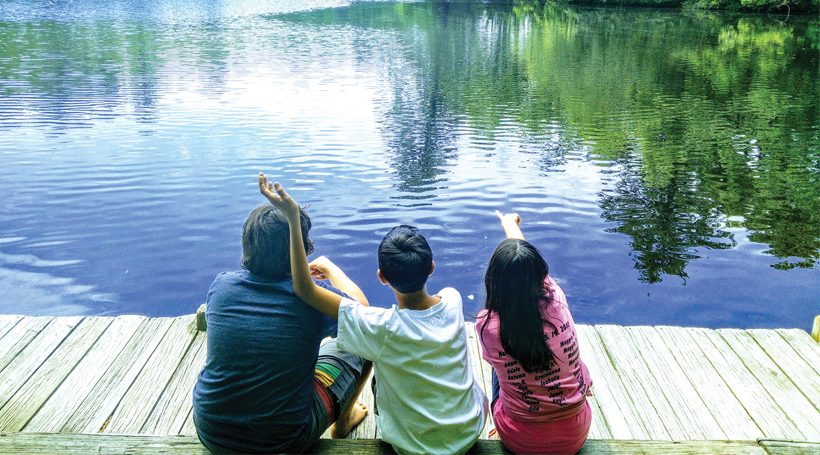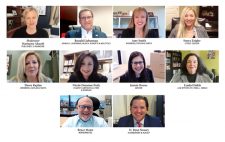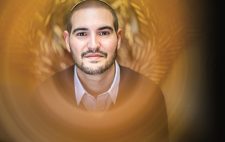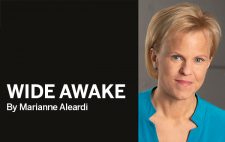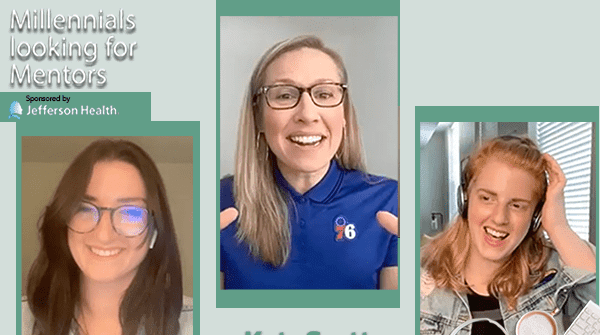When schools closed in the early months of the Covid-19 pandemic, Lisa Klose says it was the best thing that could’ve happened for her daughter, Abby.
“I think we’re the only family that Covid really helped,” Klose says. All the way through 6th grade, Abby was a typical, seemingly well-adjusted public-school student in Galloway. She kept her grades up and spent her free time on the family’s horse ranch, training for the rodeo events she competes in, Klose says.
In middle school, things changed and Abby started getting into trouble at school and at home. Her grades were slipping. As Abby – and her mom – were suffering through 8th grade, the pandemic suddenly shuttered her school, and everything changed again; this time, for the better. Abby thrived as a virtual student and was able to improve, both her grades and her rodeo skills.
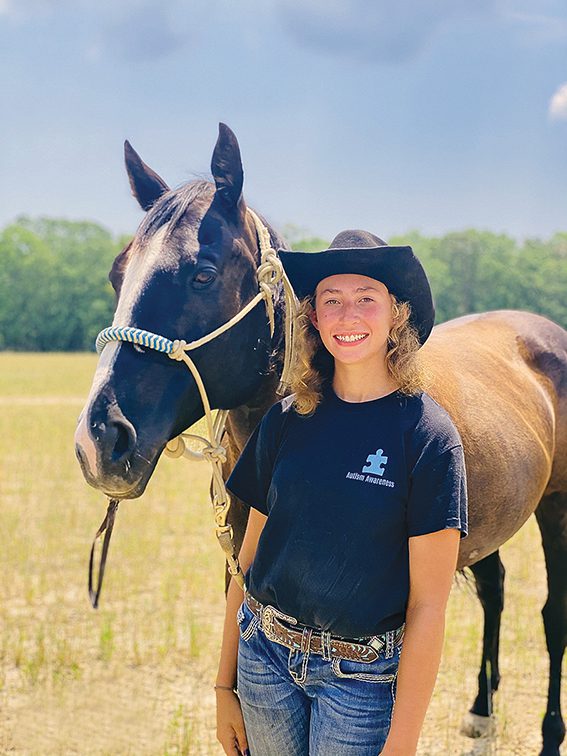

Abby Klose
When schools reopened, it was clear going back wasn’t the right choice for Abby, now 14. Instead, as high school began, she enrolled in a self-directed school – where she takes classes online and at her own pace. At the end of a program, which includes 22 individual classes, each with their own set of assessments, “she’ll have a certified, accredited high school diploma,” Klose says.
Self-directed schooling is different from virtual school or homeschooling in that students aren’t required to log in at any specific time or complete a certain amount of work each day. There’s no homework or group projects, and while there are teachers available on Zoom throughout the week if Abby needs help, most of the learning happens through pre-recorded video lectures and readings. She spends, she estimates, about 2 hours a day focused on schoolwork. It’s a version of schooling that suits Abby and frees her up to train and compete at rodeos all over the East Coast.
“When we were choosing a program, I talked to a lot of different moms,” Klose says. “When you start asking about it, you’re surprised how many kids do it, especially in the rodeo circuit.”
Klose doesn’t think the self-directed curriculum is less academically rigorous than what Abby would learn at a public high school. Abby says her social life hasn’t suffered from not attending a typical school either. “I have a whole bunch of friends on the rodeo team, and I still hang out with some friends from school,” she says. Her plan is to finish the self-directed program in as short a time as possible and “take 2 or 3 years to pro-rodeo, then go to college.”
What Abby’s doing is just one kind of alternate schooling. There are actually a surprising number of education options for kids in South Jersey beyond the typical public or private school system, and they don’t all happen online.
When summer ends at the YMCA of the Pines camp in Medford, school begins. The camp becomes the campus of South Jersey Sudbury School, a “free” or “democratic school.” There are less than a dozen Sudbury schools in the United States, most of them scattered along the East Coast. Sudbury students in kindergarten through 12th grade are responsible for their own education. In other words, there’s no homework, quizzes, essays or grades. There aren’t teachers or even classes. What and how students learn is entirely up to them, and they’re free to spend their time fishing in the camp’s lake or using its climbing wall, challenge courses and ziplines.
“Easily the most common question we get is, ‘What do you do at a school like this?’ There really is no typical day,” says Daniel Marcus, 16. The Cherry Hill resident has attended South Jersey Sudbury School since the middle of 5th grade. “Nothing set is going to happen. Everything that comes up is created by the students.”
It may sound radical, and in many ways, it is, but more families are taking the plunge. Enrollment is still small – just over 2 dozen students between the ages of 5 and 18 – but enrollment has climbed, especially since the pandemic started.
“So many people think if you’re having fun, you can’t be learning, and that’s a huge myth,” says Brian Foglia, 31. He founded South Jersey Sudbury School, which is a non-profit and considered a private education institution, 6 years ago.
“We do have a curriculum,” he says. “Maybe it’s not always academic, but it’s incredibly important. Our social structure teaches kids to resolve their conflicts. Other schools teach if there’s a problem you run to an adult and get them to solve the problem for you. But that doesn’t teach you anything.”
School rules and the occasional workshop or field trip are voted on at bi-weekly school meetings. Each student, regardless of their age, gets an equal vote – hence the term “democratic” school. As for basic academics, Foglia says all Sudbury students do learn to read and do basic math. They just do so at their own pace.
“Is algebra important for the world? Yes. Is it important for every child? I don’t know about that,” Foglia says. “I get asked about reading, writing and arithmetic a lot. Eventually most kids do get tired of asking for help, and they want to grow up, so they simply learn those things. They think, ‘I don’t want to be the only one I know who can’t read.’ The critical component is you have to want to learn it.”
Alternate schooling is a concept that can be tough for a lot of parents – and even students – to grasp, says Stephanie Abraham, an assistant professor of language and literacy education at Rowan University, because we’re so accustomed to school looking one way.
“It’s a part of us,” she says. “The first day, the school bus, picture day, prom, homework, class schedules – they’re all part of our culture. It’s how we think school works, so it’s a definition by default.”
It’s a mistake, says Abraham, to equate school with learning. They’re really separate concepts, she says.
“The kind of learning that happens in school traditionally is very direct instruction – memorization of facts and knowledge, and a regurgitation on exams to be qualified as smart or behind or ahead or passing,” she explains. “But we don’t have to learn that way, and there are other ways that may be better than just being told something by the teacher, then the child trying to do it, and passing or not. There are a lot of other ways to organize learning. That kind of regulatory behavior of children or young adults is what people who move toward alternative schools are pushing back against.”
The majority of students, Abraham says, still learn and grow effectively in a traditional school environment. But for some parents, interest in alternative models of schooling has increased as standardized testing has become more frequent and demanding.
“The focus on testing has really just pushed parents and children over the edge because so much pressure has been attached to it,” she says. During the pandemic, parents got a new perspective on their children’s learning experience. “I think people were looking at their child being connected to virtual school and staring at a screen for hours and thinking, ‘Hmm, we don’t want to do that.’ They’re listening in and saying, ‘There might be a better way.’”
Ultimately, of course, most won’t pull their kids out of school. But a movement has begun, Abraham says, to change that system from the inside out, potentially making it resemble, in some ways, something more like the self-directed learning Abby is benefitting from.
“School is a bureaucracy, it’s a hierarchy, and you have to conform to policy,” Abraham says. “They’re things we accept most of the time without question, and we forget that we made the policies and it’s possible to unmake them.”
But while the pandemic has jump-started things, it’ll still be slow going. “We’re all looking for institutional change to happen, and you get frustrated because sometimes you think you’ll retire before you see it change.”
But for students like Abby and Marcus, change has been good. Marcus says he can’t imagine ever returning to a “normal” school environment.
“It’s a weird transition to come from a place that’s all structure to a place that has zero structure,” he says. “Some kids are able to just jump right in, and for others it takes like a year sometimes. But as far as regular school, I don’t miss it at all. I just love learning things – everyone here does – and this is the place I do that best.”


